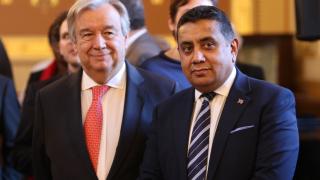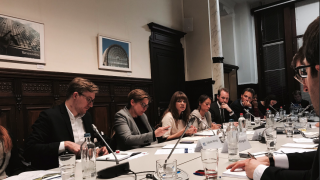
UNA-UK's Chairman, Sir Jeremy Greenstock, spoke to BBC World Service presenter Dan Damon about a call from Amnesty International to restrain the use of the Security Council veto in cases of mass atrocity.
The UK is one of five permanent members (P5) on the UN Security Council who can use the power of veto to block resolutions it disagrees with. France, Russia, China and the US also have this power, although neither Britain nor France have vetoed a Security Council resolution since 1989. Recent draft resolutions aimed at protecting civilians in Syria, as well as in Gaza, have been repeatedly vetoed by Russia, China and the US respectively.
On the World Update show, Sir Jeremy stated that UNA-UK was broadly supportive of the call, adding that Amnesty had been right to raise the issue in light of the abuse of the veto by P5 members wanting to block action in Syria. He stated, however, that the key demand should not be for all permanent members to give up the veto, but to preserve the power for issues that are close to vital national interests. He recommended further discussion on the issue and emphasised that UN member states needed to re-analyse how global cooperation could affect local conflicts.
He also referred to an upcoming trip to the United States under UNA-UK's Responsibility to Protect (R2P) programme. Sir Jeremy, accompanied by a cross-party group of parliamentarians and UNA-UK's Peace and Security Programmes Officer, Alexandra Buskie, will be in New York and Washington next week to talk to those involved with the Obama Administration's Atrocities Prevention Board and to hear about the status of R2P 10 years after it was agreed at the 2005 World Summit.
Listen to Sir Jeremy's interview with the BBC's Dan Damon (at 27 minutes)
Read more about the veto restraint intiative in UNA-UK's briefing






